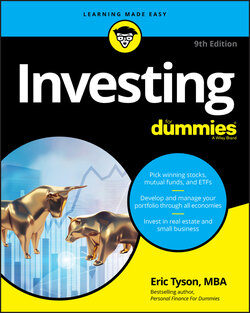Читать книгу Investing For Dummies - Eric Tyson - Страница 55
Consider your investment opportunities
ОглавлениеWhen evaluating whether to pay down your mortgage faster, compare your mortgage interest rate with your investments’ rates of return (which I define in Chapter 2). Suppose you have a fixed-rate mortgage with an interest rate of 4 percent. If you decide to make investments instead of paying down your mortgage more quickly, your investments need to produce an average annual rate of return, before taxes, of about 4 percent to come out ahead financially. (Technically, this comparison should be done on an after-tax basis, but the outcome is unlikely to change.)
Besides lacking the money to do so (the most common reason), other good reasons not to pay off your mortgage any quicker than necessary include the following:
You instead contribute to your retirement accounts, such as a 401(k), an IRA, or a SEP-IRA plan (especially if your employer offers matching money). Paying off your mortgage faster has no tax benefit. By contrast, putting additional money into a retirement plan can immediately reduce your federal and state income tax burdens. The more years you have until retirement, the greater the benefit you receive if you invest in your retirement accounts. Thanks to the compounding of your retirement account investments without the drain of taxes, you can actually earn a lower rate of return on your investments than you pay on your mortgage and still come out ahead. (I discuss the various retirement accounts in detail in the section “Funding Your Retirement Accounts” later in this chapter.)
You’re willing to invest in growth-oriented, volatile investments, such as stocks and real estate. To have a reasonable chance of earning a greater return on your investments than it costs you to borrow on your mortgage, you must be aggressive with your investments. As I discuss in Chapter 2, stocks and real estate have produced annual average rates of return of about 8 to 9 percent. You can earn even more by creating your own small business or by investing in others’ businesses. Paying down a mortgage ties up more of your capital and thus reduces your ability to make other attractive investments. To more aggressive investors, paying off the house seems downright boring — the financial equivalent of watching paint dry. You have no guarantee of earning high returns from growth-type investments, which can easily drop 20 percent or more in value over a year or two.
Paying down the mortgage depletes your emergency reserves. Psychologically, some people feel uncomfortable paying off debt more quickly if it diminishes their savings and investments. You probably don’t want to pay down your debt if doing so depletes your financial safety cushion. Make sure that you have access — through a money market fund or other sources (a family member, for example) — to at least three months’ worth of living expenses (as I explain in the earlier section “Establishing an Emergency Reserve”).
Don’t be tripped up by the misconception that somehow a real estate market downturn, such as the one that most areas experienced in the mid- to late 2000s, will harm you more if you pay down your mortgage. Your home is worth what it’s worth — its value has nothing to do with your debt load. Unless you’re willing to walk away from your home and send the keys to the bank (also known as default, which damages your credit report and score), you suffer the full effect of a price decline, regardless of your mortgage size, if real estate prices drop.
